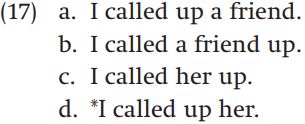

Grammar


Tenses


Present

Present Simple

Present Continuous

Present Perfect

Present Perfect Continuous


Past

Past Simple

Past Continuous

Past Perfect

Past Perfect Continuous


Future

Future Simple

Future Continuous

Future Perfect

Future Perfect Continuous


Parts Of Speech


Nouns

Countable and uncountable nouns

Verbal nouns

Singular and Plural nouns

Proper nouns

Nouns gender

Nouns definition

Concrete nouns

Abstract nouns

Common nouns

Collective nouns

Definition Of Nouns

Animate and Inanimate nouns

Nouns


Verbs

Stative and dynamic verbs

Finite and nonfinite verbs

To be verbs

Transitive and intransitive verbs

Auxiliary verbs

Modal verbs

Regular and irregular verbs

Action verbs

Verbs


Adverbs

Relative adverbs

Interrogative adverbs

Adverbs of time

Adverbs of place

Adverbs of reason

Adverbs of quantity

Adverbs of manner

Adverbs of frequency

Adverbs of affirmation

Adverbs


Adjectives

Quantitative adjective

Proper adjective

Possessive adjective

Numeral adjective

Interrogative adjective

Distributive adjective

Descriptive adjective

Demonstrative adjective


Pronouns

Subject pronoun

Relative pronoun

Reflexive pronoun

Reciprocal pronoun

Possessive pronoun

Personal pronoun

Interrogative pronoun

Indefinite pronoun

Emphatic pronoun

Distributive pronoun

Demonstrative pronoun

Pronouns


Pre Position


Preposition by function

Time preposition

Reason preposition

Possession preposition

Place preposition

Phrases preposition

Origin preposition

Measure preposition

Direction preposition

Contrast preposition

Agent preposition


Preposition by construction

Simple preposition

Phrase preposition

Double preposition

Compound preposition

prepositions


Conjunctions

Subordinating conjunction

Correlative conjunction

Coordinating conjunction

Conjunctive adverbs

conjunctions


Interjections

Express calling interjection

Phrases

Sentences


Grammar Rules

Passive and Active

Preference

Requests and offers

wishes

Be used to

Some and any

Could have done

Describing people

Giving advices

Possession

Comparative and superlative

Giving Reason

Making Suggestions

Apologizing

Forming questions

Since and for

Directions

Obligation

Adverbials

invitation

Articles

Imaginary condition

Zero conditional

First conditional

Second conditional

Third conditional

Reported speech

Demonstratives

Determiners


Linguistics

Phonetics

Phonology

Linguistics fields

Syntax

Morphology

Semantics

pragmatics

History

Writing

Grammar

Phonetics and Phonology

Semiotics


Reading Comprehension

Elementary

Intermediate

Advanced


Teaching Methods

Teaching Strategies

Assessment
Phrasal verbs and verbs with separable prefixes
المؤلف:
Rochelle Lieber
المصدر:
Introducing Morphology
الجزء والصفحة:
151-8
25-1-2022
1999
Phrasal verbs and verbs with separable prefixes
Also inhabiting the borderland between morphology and syntax are phrasal verbs in English and verbs with separable prefixes in German and Dutch. Phrasal verbs are verbs like those in (16) that consist of a verb and a preposition or particle:

Frequently, phrasal verbs have idiomatic meanings, as the glosses in (16) show, and in that sense they are like words. In terms of structure, the combination of verb and particle/preposition might seem like another sort of compound in English. Remember, however, that one of the criteria for distinguishing a compound from a phrase in English was that the two elements making up compounds could not be separated from one another. We cannot take a compound like dog bed and insert a word to modify bed (for example, *dog comfortable bed). In contrast, however, the two parts of the phrasal verb can be, and sometimes must be, separated:

When the object of the verb is a full noun phrase, the particle can precede or follow it. In the former case it is adjacent to its verb, but in the latter case it is separated from the verb. And when the object is a pronoun, the particle must be separated from the verb. So do we consider phrasal verbs to be a matter of study for morphologists, or do we leave them to syntacticians? There is no set answer to this question.
A similar issue arises with what are called separable prefix verbs in Dutch. Consider the examples in (18):

Like phrasal verbs in English, separable prefix verbs in Dutch often have idiomatic meanings. For example, opbellen, like English ‘call up’ means ‘to telephone’. Each separable prefix verb in Dutch consists of a verb preceded by a word of another category; in (18), op is a preposition, schoon is an adjective, and piano is a noun. These words therefore look a bit like prefixed words or perhaps compounds. But there’s a difference.
To understand the examples in (18) you need to know that Dutch exhibits different word orders in main clauses than in subordinate clauses. In main clauses the main verb is always the second constituent in the clause. If the subject is first, the main verb comes right after it. But in subordinate clauses, the main verb always comes last. The examples in (18) show that when the verbs opbellen ‘call up’, schoonmaken ‘make clean’, and pianospelen ‘play piano’ occur in a subordinate clause, those complex verbs come at the end of the clause. The first elements op, schoon, and piano occur attached to the verb, almost like prefixes. However, when the verb is used in a main clause, the verb itself occurs after the subject, but its first element appears separated from it at the end of the sentence. So unlike normal prefixes, these elements sometimes are not attached to the verbs with which they normally form a unit. Are separable prefix verbs a matter for morphologists or for syntacticians? Again, there is no easy answer to this question, as they lie on the border between the two.
 الاكثر قراءة في Morphology
الاكثر قراءة في Morphology
 اخر الاخبار
اخر الاخبار
اخبار العتبة العباسية المقدسة

الآخبار الصحية















 قسم الشؤون الفكرية يصدر كتاباً يوثق تاريخ السدانة في العتبة العباسية المقدسة
قسم الشؤون الفكرية يصدر كتاباً يوثق تاريخ السدانة في العتبة العباسية المقدسة "المهمة".. إصدار قصصي يوثّق القصص الفائزة في مسابقة فتوى الدفاع المقدسة للقصة القصيرة
"المهمة".. إصدار قصصي يوثّق القصص الفائزة في مسابقة فتوى الدفاع المقدسة للقصة القصيرة (نوافذ).. إصدار أدبي يوثق القصص الفائزة في مسابقة الإمام العسكري (عليه السلام)
(نوافذ).. إصدار أدبي يوثق القصص الفائزة في مسابقة الإمام العسكري (عليه السلام)


















